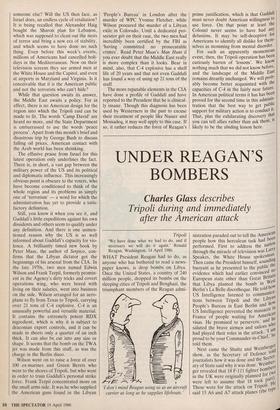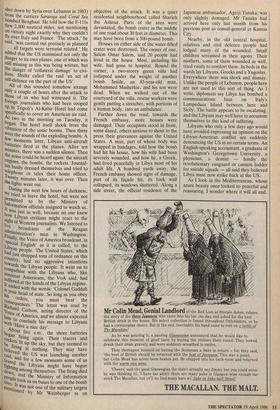UNDER REAGAN'S BOMBERS
Charles Glass describes
Tripoli during and immediately after the American attack
Tripoli We have done what we had to do, and if necessary we will do it again.' Ronald Reagan, Washington, 14 April 1986.
WHAT President Reagan had to do, as anyone who has bothered to read a news- paper knows, is drop bombs on Libya. Once the United States, a country of 240 million people, dropped its bombs on the sleeping cities of Tripoli and Benghazi, the triumphant members of the Reagan admi-
'I don't mind Reagan using us as an aircraft carrier as long as he supplies lifeboats.'
nistration paraded out to tell the American people how this herculean task had been performed. First to address the through the miracle of television was Larry Speakes, the White House spokesman. Then came the President himself, sounding buoyant as he presented to the public the evidence which had earlier convinced n° European state other than Great Brit°, that Libya planted the bomb in Wes' Berlin's La Belle discotheque. He told hold US Intelligence listened to communica- tions between Tripoli and the Libyan People's Bureau in East Berlin and hold nation US Intelligence prevented the massacre In France of people waiting for Amettc,a° visas. He promised to persevere, and on saluted the brave airmen and sailors WO had played their roles in the attack. `1,a,111 proud to be your Commander-in-Chief, 'le told them. Next came the Shultz and Weinberge,Air show, as the Secretary of Defence tot': journalists how it was done and the Secret . ary of State said why it was done. Weinbet ger revealed that 18 F-111 fighter bombers__ in the UK were originally planned for (vv,c were left to assume that 18 took parts were for the attack on Tripoli• tie said 15 A6 and A7 attack planes (the tyP shot down by Syria over Lebanon in 1983) from the carriers Saratoga and Coral Sea bombed Benghazi. He told how the F-111s flew 2,800 nautical miles, not mentioning on victory night exactly why they couldn't fly over Italy and France. 'The attack,' he said, 'was carried out precisely as planned • • . all targets were terrorist related.' He added that the US minimised not only the danger to its own planes, one of which was still missing as this was being written, but the danger of 'collateral damage' to civi- lians. Shultz called the raid 'an act of self-defence on the part of the US'. All of this sounded somehow strange Only a couple of hours after the attack to those of us who had witnessed it. The foreign journalists who had been cooped °P in Tripoli's Al-Kabir Hotel had come specifically to cover an American air raid. At two in the morning on Tuesday, it began. The hotel itself shook from the vibration of the sonic booms. Then there were the sounds of the exploding bombs. A few moments later, Libyan anti-aircraft batteries fired at the planes. After ten minutes, there was a sudden silence. Then the noise could be heard again: the aircraft engines, the bombs, the rockets. Journal- ists busily dressed themselves and tried to telephone or telex their home offices. Twenty minutes later, it was over. Then the lights went out.
During the next few hours of darkness, we tried to leave the hotel, but were not permitted to by the Ministry of Information officials assigned to watch us. It Was just as well, because no one knew how Libyan civilians might react to the sight of Western journalists. We listened to live broadcasts of the Reagan administration's men in Washington. Finally, the Voice of America broadcast, in 'special English' as it is called, to the Libyan people. The United States, which had Just dropped tons of ordnance on this fe°untrY, had no aggressive intentions towards the Libyan people. It went on to sympathise with the Libyans who, like innocent Americans, the VoA said, had suffered at the hands of the Libyan regime. It is ended with the words: 'Colonel Gaddafi Your head of state. So long as you obey his orders, you must bear the Tnsequences.' The letter was read by Vohard Carlson, acting director of the k.niee of America, and we almost expected "..n to conclude his message to Libyans wnh Have a nice day'. About five a.m., the shore batteries began firing again. Their tracers and uckets lit up the sky, but they seemed to be firing at nothing. They may have bald, the US was launching another feki, and for a few moments some of us fi Ired the Libyans might have begun d,,gnting among themselves. The firing died and the Ministry of Information Orole took us on buses to one of the bomb sites.It was not one of the military targets Mentioned by Mr Weinberger as an objective of the attack. It was a quiet residential neighbourhood called Sharieh ibn Ashour. Parts of the area were devastated, the bomb crater in the middle of one road about 30 feet in diameter. This may have been from a 500-pound bomb.
Houses on either side of the water-filled crater were destroyed. The owner of one, Salem Omar Salem, said 20 people had lived in the house. Most, including his wife, had gone to hospital. Round the corner, a two-storey green villa had collapsed under the weight of another bomb. Inside, an 85-year-old man, Mohammed Masherkie, and his son were dead. When we walked out of the courtyard of the villa, rescue workers were gently putting a stretcher, with portions of a human body, into an ambulance.
Further down the road, towards the French embassy, more houses were damaged. Their occupants stood in front, some dazed, others anxious to shout to the press their grievances against the United States. A man, part of whose body was wrapped in bandages, told how the bomb had hit his house, how his wife had been severely wounded, and how he, a Greek, had lived peacefully in Libya most of his adult life. A hundred yards away, the French embassy showed signs of damage, part of its façade hit, its back wall collapsed, its windows shattered. Along a side street, the official residence of the Japanese ambassador, Ageiji Tanaka, was only slightly damaged. Mr Tanaka had arrived here only last month from his previous post as consul-general in Kansas City.
Nearby, in the old central hospital, relatives and civil defence people had lodged many of the wounded. Small children screamed in their agony. Their mothers, some of them wounded as well, tried vainly to comfort them. In beds in the wards lay Libyans, Greeks and a Yugoslay. Everywhere there was shock and dismay. Unlike the people of Lebanon, people here are not used to this sort of thing. As I write, diplomats say Libya has bombed a communications base on Italy's Lampedusa Island between here and Sicily. The battle appears to be escalating, and the Libyans may well have to accustom themselves to this kind of suffering.
Libyans who only a few days ago would have avoided expressing an opinion on the Libyan-American conflict are suddenly denouncing the US in no certain terms. An English-speaking accountant, a graduate of Washington's Georgetown University, a physician, a dentist — hardly the revolutionary vanguard or cannon fodder for suicide squads — all said they believed Libya must now strike back at the US.
As I look at the Mediterranean, whose azure beauty once looked so peaceful and reassuring, I wonder where it will all end.



















































 Previous page
Previous page